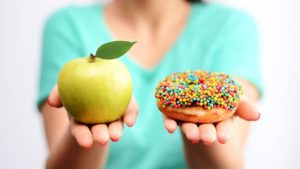
What Are Calories?
What Are Calories?
Calories…we’re always talking about them. We eat and count them. We burn and balance them. We watch them and cut them. And when we overeat them, we often curse calories for making us fat.
For all the attention we pay to calories, you’d think we would have a pretty good idea of what they are. But the truth is, most people would find it difficult to explain exactly what calories are.

What calories are…and what they aren’t
Many people think of calories as “things” in your food that, if you eat too many of them, will put weight on you. Eating more calories than you need will likely lead to weight gain, that part is certainly true.
But calories aren’t “things” that you can see or touch. You can’t pick them out of your food or push them to the side of your plate. Love ‘em or hate ‘em, they’re something you simply cannot live without.
A calorie is simply a unit of energy—it’s a measurement, just like inches or degrees or kilograms. In technical terms, a calorie (or, when accurately used to describe the calories in food, a kilocalorie) is the amount of energy that is needed to raise the temperature of a kilogram of water by one degree Celsius. So what does that have to do with the calories on your plate?
A calorie is simply a unit of measurement of the energy in the foods that you eat. Your body doesn’t use energy to raise the temperature of the water, but you need energy (measured as calories) to fuel all of your daily functions. This includes your basic metabolic processes, as well as all the activity you engage in throughout the day. In order for your body to tap into this energy, it first has to be released from the foods you eat.
Providing energy to the body is often compared to the way you provide energy to your car. When you put fuel in your car’s tank, there is energy (which could also be measured in calories!) “locked up” in the gasoline. But just having gas in the gas tank isn’t enough to make the car move. In order for that to happen the fuel has to be ignited in the engine, which releases the energy from the gasoline—energy that can be used to propel the car.
Similarly, the food (fuel) that you eat has energy in the form of calories that are locked up in the protein, fat, and carbohydrate (and sometimes alcohol) that you eat. Much like the energy is released when the gasoline ignites in your car’s engine, the food you eat has to be digested and metabolized to release the energy that can be used to fuel your body.
These calories are absolutely necessary to live. Your resting metabolic rate (the number of calories your body uses every day for the most basic processes just to keep you alive) accounts for about 75 percent of the calories your body uses every day. The remaining amount that you burn during the day is used to fuel your muscles, as you move around throughout your day and engage in exercise. And a very small amount is used to digest and process your food.







